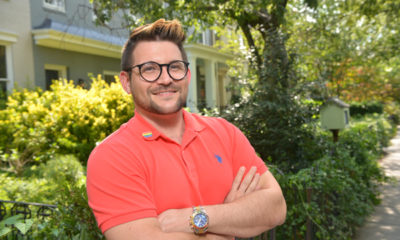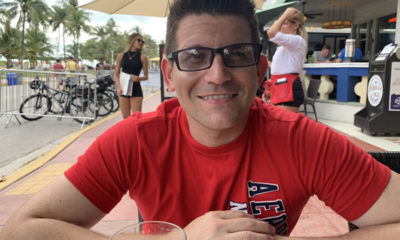News
Una tarde con Yariel
Ha permanecido bajo custodia de ICE por casi un año
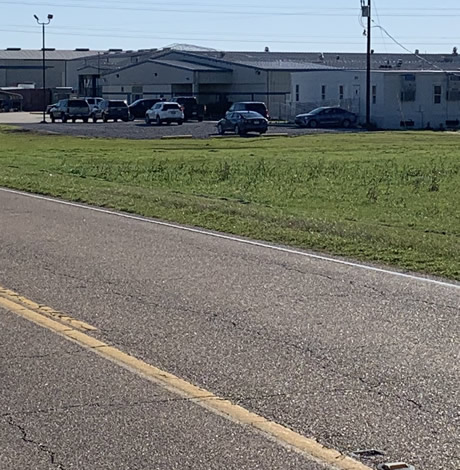
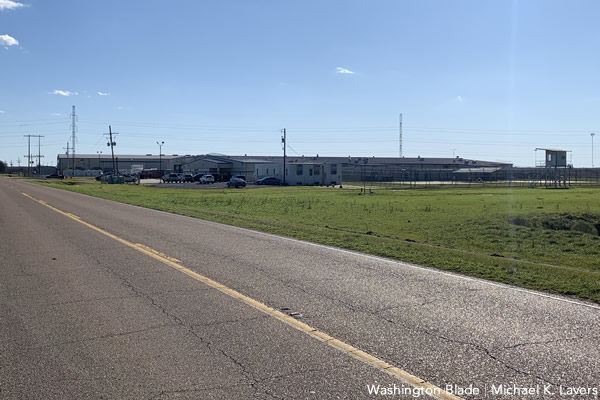
Nota del editor: Una versión de esa nota de opinión en inglés salió en el sitio web del Blade el 4 de febrero.
FERRIDAY, Luisiana — Un guardia masculino al River Correctional Center, un centro de detención privado en el Condado Concordia en Luisiana, me llevó a la sala de visitantes un poco después de la 1 p.m. el sábado. Me senté en una mesa grande —como las que se pueden encontrar en una cafetería de la escuela— y miré a las murallas con mensajes de empoderamiento que habían sido pintados en la pared. Unos minutos después, miré hacía la puerta con una pequeña ventana y vi a Yariel, que vestía un traje verde de rayas. Otro guardia masculino abrió la puerta y Yariel entró la sala. Nos abrazamos fuertemente unos segundos después. Estaba casi sollozando, pero Yariel me aseguró que estaba bien. Después de un par de minutos, nos sentimos en la mesa —uno frente al otro— y empezó nuestra visita. Usé una de las servilletas que tomé de una gasolinera cercana para limpiar las lágrimas de mis ojos. Después de un par de minutos, puse sus manos en las mías y comenzó a llorar. Le di una de las servilletas de la gasolinera para limpiar sus ojos y traté de consolarlo.
“Esta bien llorar”, lo aseguré.
No había visto a Yariel en persona desde el 27 de enero de 2019. Habíamos pasado el día reportando desde un albergue de migrantes dirigida por una lesbiana en Mexicali, una ciudad mexicana en la frontera con EEUU, y lo dejé al apartamento pequeño en Tijuana en que vivía con su padre. Estábamos casi mareados, en parte, porque habíamos cantado canciones de Lady Gaga como locos durante el viaje de dos horas entre Mexicali y Tijuana. Esos momentos despreocupados parecen de toda la vida.
Yariel el sábado me dio dos regalos: Una pulsera hecha de piezas de bolsas de basura negras y blancas y un zapatillo hecho de paquetes de Maruchan y envoltorios de crema de café que hará un buen ornamento navideño. Hablamos como amigos, como hermanos. Hablamos sobre Cuba y el juicio político del presidente Trump. Lo compré una botella de Sprite de una máquina expendedora en la sala. También compartimos una bolsa de Doritos. Una guardia femenina que habla español estaba en la sala con nosotros. Al principio estuve un poco incómodo de verla escribiendo en un cuaderno, pero después de unos minutos olvidé que estaba allí.
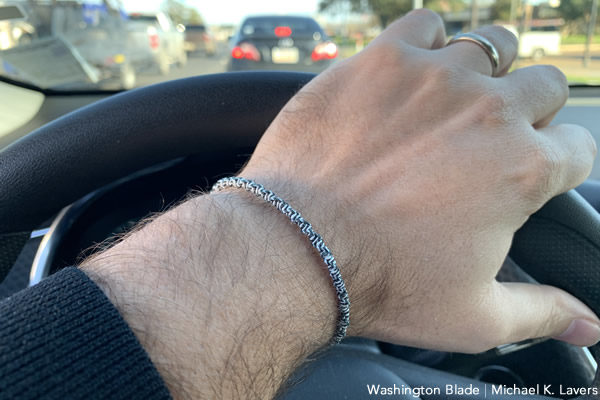
A las 2:50 p.m., nos dijo en español que nuestra visita iba a terminar en 10 minutos. Yariel quería darme dos carpetas con sus escritos sobre su tiempo bajo custodia del Servicio de Inmigración y Control de Aduanas (ICE), pero la guardia lo dijo que no podría tomarlas conmigo. Yariel había colocado la pulsera alrededor de mi muñeca y un supervisor dijo a la guardia que podría llevar el ornamento conmigo. Los puse, junto con su foto del tamaño de un pasaporte, en mi mano. Nos pusimos de pie y nos abrazamos fuertemente. Lo dije que lo quiero y luego salimos por puertas diferentes. Salí por la puerta principal de la instalación menos de cinco minutos después y regresé a mi hotel en Kenner, un suburbio de Nueva Orleans, a las 6:45 p.m.
Ha pasado casi un año desde que Yariel pidió asilo en EEUU y entró la custodia de ICE. Los lectores del Washington Blade saben que un juez el pasado septiembre concedió asilo a Yariel. También saben que su destino está en las manos de la Junta de Apelación de Inmigración en Virginia porque ICE apeló el fallo.
Hay cierta ironía en el hecho que Yariel comenzó escribir para el Blade en el otoño de 2018, en parte, porque necesitábamos un reportero en Tijuana que pudiera reportar sobre los migrantes LGBTQ que llegaban a la ciudad con las caravanas migratorias de Centroamérica. La cobertura del Blade de estos temas continua, con mi más reciente viaje a Honduras y El Salvador que terminó hace seis días antes de mi visita con Yariel. Esta cobertura sigue siendo tan importante como siempre con la política migratoria de línea dura de la administración Trump continúan poniendo en riesgo a los migrantes LGBTQ.
También se convierte en algo profundamente personal.
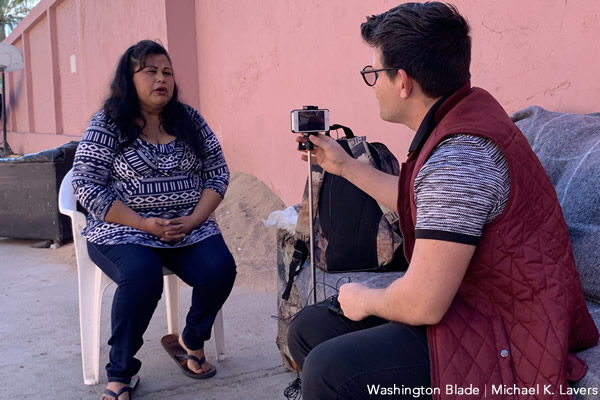
Mi esposo y yo el viernes, unas horas antes de volar a Luisiana, asistieron una ceremonia en Durham, Carolina del Norte, donde nuestro querido amigo Marcelo se convirtió en ciudadano estadounidense. Marcelo, un bailarín para el Carolina Ballet de origen paraguayo, trabajaba muy duro para llegar a ese momento y estamos muy orgullosos de él.
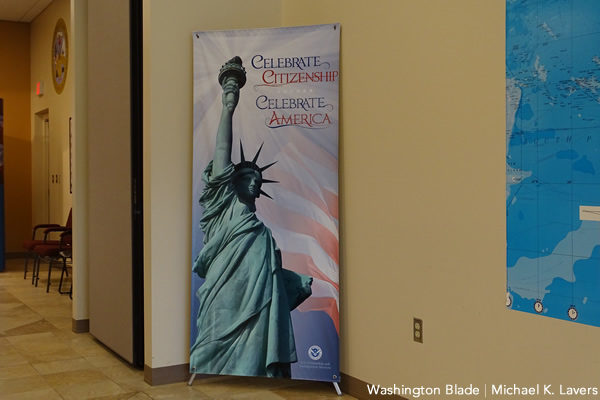
Uno de los momentos más memorables de la ceremonia fue el video en que Trump felicitó a Marcelo y los otras 56 personas que acababan de convertirse en ciudadanos estadounidenses. Ninguno de ellos aplaudió al final del video. Ellos, junto con el resto de nosotros, saben mierda cuando la escuchan, y todos respondimos en especie.
Estos ciudadanos estadounidenses, junto con Yariel, son exactamente el tipo de personas que harán una contribución positiva a este país y lo hará aún mejor. Merecen nuestro respeto y apoyo, no retorica barata basada en racismo, xenofobía y supremacía blanca para apaciguar una base política antes de una elección presidencial.
Una de las partes más desgarradoras de mi visita con Yariel fue cuando me dijo que más desea es su libertad que lo permitirá empezar una nueva vida en los EEUU sin miedo de persecución. La lucha para hacer realidad el sueño de Yariel sigue. Espero que mi próximo viaje a Luisiana sea recogerlo después de la Junta de Apelaciones de Inmigración confirme su decisión de asilo y ICE finalmente lo libere de su custodia.
Siempre estaré a tu lado, Yariel.
Philippines
Philippines Supreme Court rules same-sex couples can co-own property
Advocacy group celebrated landmark decision

The Philippines Supreme Court in a landmark ruling said same-sex couples can co-own property under the country’s Family Code.
The Philippine News Agency on Tuesday notes the court issued its ruling in the case of two women who bought a house in Quezon City, a suburb of Manila, the Filipino capital, before they broke up.
The two women, according to the Philippine News Agency, “agreed to sell the property” after they ended their relationship, “and the registered owner — the respondent — signed a document acknowledging that the other partner paid for half of the purchase and renovations.” The Philippine News Agency notes “the registered owner” later “refused to sell the property and withdrew her earlier acknowledgment of co-ownership, prompting the other partner to file a complaint.”
A Regional Trial Court and the Philippines Court of Appeals ruled against the plaintiff.
The Supreme Court in a 14-page ruling it issued on Feb. 5 overturned the decisions. The Supreme Court published its decision on Tuesday.
“Considering that there is co-ownership between petitioner and respondent, then each co-owner may demand at any time the partition of the thing owned in common, insofar as her share is concerned,” said the Supreme Court in its ruling, according to the Philippine News Agency. “Having rightful interest over the subject property, petitioner has the right to demand the division of the subject property.”
The predominantly Catholic country’s Family Code defines marriage as “a special contract of permanent union between a man and a woman entered into in accordance with law for the establishment of conjugal and family life.” It also states in Article 148 that “in cases of cohabitation” outside of marriage, “only the properties acquired by both of the parties through their actual joint contribution of money, property, or industry shall be owned by them in common in proportion to their respective contributions.”
“In the absence of proof to the contrary, their contributions and corresponding shares are presumed to be equal,” it reads.
The BBC reported the Supreme Court ruling states this provision “applies to all forms of co-habitation,” regardless of the couple’s gender. A Supreme Court press release indicates the decision notes lawmakers and the Filipino government “must address same-sex couples’ rights, as courts alone cannot resolve all related policy concerns.”
“This court does not have the monopoly to assure the freedom and rights of homosexual couples,” it reads. “With the political, moral, and cultural questions that surround the issue concerning the rights of same-sex couples, political departments, especially the Congress must be involved to quest for solutions, which balance interests while maintaining fealty to fundamental freedoms.”
LGBT Pilipinas, a Filipino advocacy group, welcomed the ruling.
“This ruling marks a monumental step forward in the legal recognition of LGBTQ+ families and relationships in the country,” it said in a statement.
LGBT Pilipinas added the ruling “lays a crucial legal foundation for broader recognition of same-sex relationships and strengthens the push for comprehensive anti-discrimination protections.”
“This is a win not only for the LGBTQ+ community, but for fairness and justice in Philippine society as a whole,” said the group.
Florida
Disney’s Gay Days ‘has not been canceled’ despite political challenges
GayDays is moving forward with its planned LGBTQ meet-up

Gay Days in Orlando is preparing for its 2026 gathering though organizers have yet to release full details.
Concerns emerged about the status of the annual meetup of LGBTQ people at Walt Disney World in Orlando, Fla., after social media posts and multiple news outlets reported the event would not take place this year.
In response to inquiries from the Blade, Josh Duke, co-owner of Gay Days, clarified that an update would come this week.
“At this time, I’d like to clarify that Gay Days Orlando has not been canceled,” an email to the Blade said. “We are currently finalizing details regarding our plans for 2026 and will be making an official announcement later this week.”
Earlier this week, Gay Days posted about a pause in their plans for the annual meeting, which quickly gained traction online.
In an official statement on social media, Gay Days organizers cited several factors behind what had initially appeared to be a cancellation of their 2026 event.
“Changes to our host hotel agreement, the loss of key sponsorship support, and broader challenges currently impacting LGBTQIA+ events nationwide made it impossible to deliver the experience our community deserves,” organizers wrote. However, the statement added, “This is a pause — not an ending.”
In a longer message shared with supporters, organizers elaborated on that now-reversed decision.
“Gay Days Family — it is with very heavy hearts that we share Gay Days 2026 will not take place this year. This was an incredibly difficult decision and one that was only made after every possible option was explored.
“Gay Days has always been more than an event — it is community, family, and a place where so many memories are made. While this pause is painful, it also gives us the opportunity to step back, listen, and begin shaping a stronger and reimagined GayDays for the future. Thank you for your continued love, patience, and support. This is not goodbye — it’s a reset, and we look forward to creating the future of GayDays together.”
GayDays, which began in 1991, encourages queer Disney fans to visit the Orlando theme park while wearing red shirts to identify one another. Originally focused on gay men reclaiming the childhood joy often denied due to homophobia, the event has expanded over the years to include LGBTQ+ families on summer vacations and queer couples honeymooning in the Magic Kingdom.
Disney made history in 2019 by holding its first-ever official Pride event at its European park, Disneyland Paris. In 2023, Disneyland California hosted the first U.S. official Pride event.
Concerns about the potential cancellation had arisen amid broader challenges affecting LGBTQ events nationwide. These include changes in hotel agreements, sponsorship support, and Florida’s increasingly restrictive anti-LGBTQ policies under Gov. Ron DeSantis. Florida currently has an equality score of -3.00 out of 49 from the Movement Advancement Project, which evaluates states based on policies affecting relationship and parental recognition, nondiscrimination, religious exemptions, LGBTQ youth, healthcare, criminal justice, and transgender identity documentation.
Recent legislation in Florida has included prohibitions on hormone replacement therapy for transgender minors, restrictions on adult access to treatment, bans on drag performances for those under 18, bathroom bans for transgender people in state buildings, and expansion of the Parental Rights in Education Act, commonly called the “Don’t Say Gay” law. These measures limit public school instruction or discussion about sexual orientation and gender identity.
Gay Days Anaheim is scheduled to take place at Disneyland Resort in September.
Disney has also maintained a focus on Pride, reporting in 2022 that proceeds from Pride merchandise benefited numerous LGBTQ organizations, including GLSEN, PFLAG, The Trevor Project, Zebra Coalition, the Los Angeles LGBT Center, the LGBT Center Orange County, the San Francisco LGBT Center, and the Ali Forney Center. Pride merchandise sold internationally supports local LGBTQ organizations in those regions.
More details about this event are expected to be released on Friday.
New York
Pride flag removed from Stonewall Monument as Trump targets LGBTQ landmarks
The new NPS policy targets Pride flags amid consistent efforts from the Trump administration to minimize LGBTQ history.

A rainbow Pride flag flying at the Stonewall National Monument in New York was removed at the direction of Trump administration officials at the National Park Service, according to a source familiar with the matter who spoke to the Blade on condition of anonymity.
The source said the move had been in the works for weeks and is part of ongoing efforts by the Trump-Vance administration to erase LGBTQ identity from federally controlled landmarks.
In response to the Blade’s request for information about the new flag policy, the National Park Service provided the following statement:
“Current Department of the Interior policy provides that the National Park Service may only fly the U.S. flag, Department of the Interior flags, and the Prisoner of War/Missing in Action flag on flagpoles and public display points. The policy allows limited exceptions, permitting non-agency flags when they serve an official purpose. These include historical context or reenactments, current military branch flags, flags of federally recognized tribal nations affiliated with a park, flags at sites co-managed with other federal, state, or municipal partners, flags required for international park designations, and flags displayed under agreements with U.S. Citizenship and Immigration Services for Naturalization ceremonies.”
The statement also included official guidance on the display of non-agency flags issued by Trump-appointed National Park Service Director Jessica Bowron.
The Blade reached out to other organizations to confirm the status of the Pride flag last week, including the Stonewall National Monument Visitor Center, the NYC Landmarks Preservation Commission, and the National Parks Conservation Association. None were able to provide details about whether the flag was still flying at that time but it has since been removed.
This action aligns with other moves targeting and erasing LGBTQ history. In September, the Blade reported that three organizations originally slated to receive more than $1.25 million from the National Park Service’s Underrepresented Communities Grant Program would no longer receive funding: In Washington, D.C., the Preservation League had been awarded $75,000 to document LGBTQ+ historic resources. In Providence, R.I., the Preservation Society was slated for $74,692 to conduct an LGBTQ+ survey and prepare a National Register nomination. And in New York, the Fund for the City of New York, Inc., had been awarded $32,000 to nominate the residence of Bayard Rustin — the iconic civil rights and LGBTQ activist — as a National Historic Landmark.



